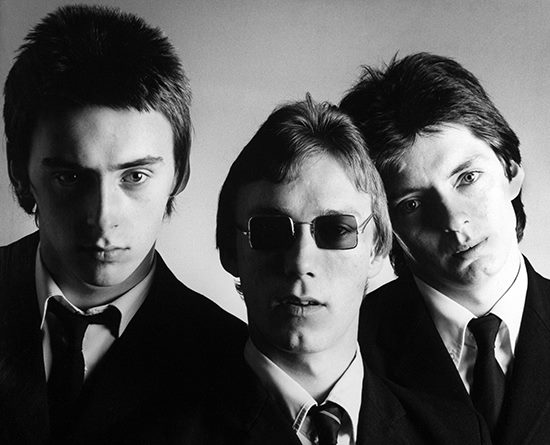

In May 1977, a three-piece rock group from Woking appeared on Top Of The Pops. You can see what happened on YouTube: the presenter announcing an ‘effervescent new 45 called ‘In The City’, and the 140 seconds of wonderment that followed. The song fizzed with the energy and sense of purpose that was firing what had been called punk and was now mutating into New Wave, but it had a lot more: a melodic charge – as in the glorious opening riff – that betrayed its makers’ love of classic British pop, and the clear sense that the band’s main creative force was already thinking like an accomplished songwriter.
Between 1977 and 1982, the band released an incredible array of music. In the UK, there were five albums and 17 singles, a stack of number 1s, and a journey which encompassed no end of influences, styles, and textures.
Their debut album ‘In The City’ was recorded in just 11 days and featured a mix of R&B covers and originals, with more than a nod to Wilko Johnson and Pete Townshend. The follow up ‘This Is The Modern World’, released only 6 months later, cemented the look and feel of the band and peaked in the British charts at number 22. ‘All Mod Cons’, released late in 1978, was a turning point in The Jam’s career; Weller’s song writing was becoming more melodic and lyrically incisive. Now more Ray Davies than Pete Townshend. The album was a major success, peaking at number six on the U.K. charts.
‘Setting Sons’, released at the end of 1979, was a huge follow up, climbing to number 4 in the U.K. It remains one of The Jam’s most critically favoured albums and marks the point the band became full-fledged rock stars in Britain. By the time ‘Sound Affects’ arrived in 1980 the band seemed unstoppable, the album went to number 2 and the 3 ensuing singles all hit top 5. 1982’s ‘The Gift’, the band’s only number 1 album, showcased Weller’s new found soul infatuation and with it came his frustration with the band’s musical direction and he made the decision to disband the group. On the heels of the number two hit ‘The Bitterest Pill’ and at the peak of their success The Jam announced their breakup in October of 1982.